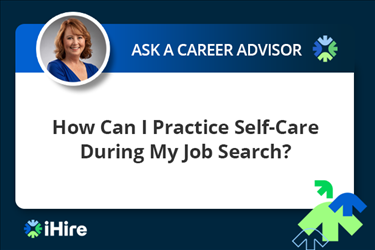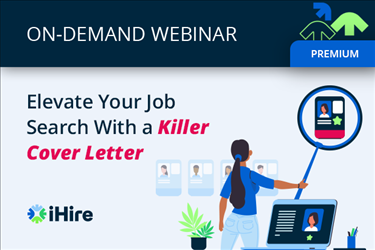- Job Seeker Resources
- |
- Last Updated: May 20, 2022

Job Search Glossary: Common Terms and Helpful Resources
Job Search Terminology You Need to Know
The process of job hunting has changed dramatically in the last several years. Whether you’re a recent grad looking for comprehensive job search help or a well-versed job seeker encountering new job search terminology, this glossary is a must read. It not only defines common job search terms you might not know, but also provides links to helpful resources for a wide range of topics.

Job Search
Active job seeker
Someone who is currently looking for a new job.
Career center
Departments within colleges and universities that help prepare students for professional life. They may offer resume critiques, interview preparation assistance, or other career-related product discounts.
3 Ways to Win with Your Career Center
Employee referral
When a current employee recommends someone they know for a job opportunity within the company.
Follow-up
Calling or emailing the contact listed in the job ad after submitting your application or attending an interview.
Following up on Job Applications: A Job Seeker "Must"
Hiring manager
HR representative assigned to screen and hire job seekers to fill job openings.
iMatch
iHire’s proprietary program that learns your preferences from your profile settings and activity on the site. iMatch truly individualizes every iHire member’s experience and delivers opportunities you really want to see.
iMatch Job Matching Technology
In-network employer
Employers who advertise their positions with iHire directly. Job seekers of any iHire membership level can view and apply to in-network employers’ jobs.
Job alerts
Email delivered at an adjustable interval that lists job openings you’re likely to be interested in.
Job boards
Websites on which employers post job ads and job seekers search for new career opportunities.
Job fair (aka: career fair / career expo)
Event at which representatives from currently hiring companies describe their open positions to attendees who are seeking employment.
Get the Most out of a Job Fair
Job shadowing
When someone inexperienced in a particular role or career follows someone more experienced to learn about their daily duties and responsibilities.
Job tracker
iHire’s tool for organizing your job search. Job seekers can save job openings to look at later, mark jobs as “applied,” “interview scheduled,” or “offer received,” as well as add their own notes to the position.
Introducing Job Tracker: Your Search's New BFF
Social media network focused on career growth and professional networking.
Utilizing LinkedIn to Enhance Your Job Search
How to Use Social Media to Find Your Next Job
Optimize Your Social Media Profiles to Get Hired
Networking
Connecting and maintaining relationships with other professionals in your industry.
3 Cs of Networking
Too Shy to Network? These 5 Pointers Can Help.
Niche job board
Job board that focuses exclusively on opportunities in your industry.
Case for Industry-Specific Job Boards
Passive job seeker
Anyone who isn’t actively looking for a new job, but is open to other opportunities that come along. May subscribe to job alerts or follow their favorite employers’ social media accounts.
3 Proven Job Search Hacks for Passive Job Seekers
Personal brand statement
A short (1–2 sentences) explanation of your professional identity and the unique value you bring to your employers.
5 Steps to a Strong Personal Brand
Professional bio
Similar to a resume summary, this short blurb outlining your professional career and qualifications can be used for social media profiles, career portfolios, and interviews.
Professional portfolio (aka: career portfolio)
Additional documentation of your professional strengths that were not included in the original job application, such as work samples, an infographic resume, or work references. May be published online or as a hard copy file.
How to Craft a Professional Portfolio
Recruiter (aka: headhunter)
Hiring professional designated to seek out new candidates to fill job openings.
Researching employers
A job seeker’s investigation of an organization’s values, needs, culture, products/services, and their position in the industry relative to competitors.
3 Key Strategies for Researching Potential Employers
Skill gap
When an industry experiences high demand for certain skills that are in low supply.
Finding Talent in the Skills Gap
Target company list
List of companies a job seeker would like to work at and plans to apply to. Targeting companies may be an alternative to seeking out individual job ads.
Targeting Top Companies
3 Key Strategies for Researching Potential Employers

Preparation and Qualifications
Apprenticeship
Paid training experience in which someone new to their field works under the direct guidance of an experienced professional.
Emotional intelligence (aka: emotional IQ)
Ability to manage your own emotions as well as understand others’ feelings and adjust your behavior accordingly.
Hard skill
Occupation-specific knowledge and technical capabilities.
Internship
Learning experience for someone (like a student) with little to no experience in their field. Role may be paid or unpaid, and could lead to a full-time position.
5 Tips for Your First Job Search
Create an Interview-Winning Resume Without Paid Experience
Overqualified
A job seeker whose career and professional experience suggests they would succeed in a position with greater responsibilities than the one under consideration.
Professional development
Workshops, courses, or lectures you take to expand your knowledge of topics in your field.
Qualified
A job seeker whose track record matches the criteria for a particular position.
Relevant experience
Any roles you’ve held, paid or unpaid, in which you used the same skills required for a particular job or career.
Strengths Weaknesses Opportunities Threats (SWOT)
4 areas that can help you identify the best way to sell yourself to potential employers.
Transferable skill
Any hard or soft skill you can use in more than one profession.
Underqualified
Job seeker who does not have the relevant career background or other credentials typically desired for a particular position.
Volunteering (aka: community service)
Unpaid experience that (if career-relevant) can serve as a resume builder.
How to Find Volunteer Opportunities to Build Your Experience

Application Process
Applicant tracking system (ATS)
A computer program that scans resumes for specific data, such as keywords and contact information. They are used to filter out unqualified applicants.
An Intro to ATSs
What Your Resume Needs to Survive the ATS
Assessment
Additional screening procedure that measures competencies relevant to the position you’re applying for. Will likely involve completing a task similar to those you will perform as an employee.
Background check
Screening procedure that provides information about a job applicant’s past. Specific areas of inquiry depend on the employer.
Reasons Not to Fear Background Check
Cover letter
3–5 paragraph letter introducing your resume and describing why you would bring value to a potential employer’s organization.
How to Write an Effective Cover Letter
A Cover Letter That Works
Job application
All materials sent from a job seeker to a prospective employer. Could include cover letter, resume, and/or supplemental questions requested by the hiring company.
Avoid These 5 Careless Job Application Mistakes
Job reference
Someone an employer can contact to verify your work history, professional strengths, and other qualifications. There are two types: personal references and professional references.
Ultimate Guide to Job References
Keeping Track of Job References: Tips & Templates
How Your Job Reference Page Should Look and Other Helpful Tips
Personal reference
Job reference who can vouch for your disposition and character.
Professional reference
Job reference who has worked with you in the past and can attest to your skills and accomplishments. More common than personal/character references.
Reference list (aka: reference page)
Sheet of contact information for 3–5 job references you can give employers.
How Your Job Reference Page Should Look and Other Helpful Tips
Resume
Certified resume writer
Professional writer who has completed a specialized course of study in crafting resumes and passed a rigorous certification exam.
Chronological resume
Resume format that lists previous positions in reverse chronological order. Typically best for professionals who have advanced through positions of increasing responsibility.
A Look at the 3 Top Resume Strategies
Core competencies (aka: key skills)
List of ATS-scannable skills that appears directly after your resume summary.
Curriculum vitae (CV)
Highly detailed outline of qualifications structured in a specific way. Typically used when applying for academic, education, scientific, or research positions.
Functional resume (aka: skills-based resume)
Focuses on key skills and accomplishments in a “Career Highlights” section directly after your core competencies. Downplays spotty or largely unrelated job backgrounds by listing previous positions in a “Work History” section that includes only company name, job title, and years worked for each role.
A Look at the 3 Top Resume Strategies
Hybrid resume
Resume format that combines the strengths of chronological and functional resumes. Includes a short “Career Highlights” section of your most impressive and/or relevant accomplishments before the “Professional Experience” section.
A Look at the 3 Top Resume Strategies
Infographic resume (aka: graphic resume)
Creative, graphic representation of your more traditional resume. Good for online professional portfolios.
Modern Resumes: How Creative is Too Creative?
iScore Resume Match
iHire’s rating tool that measures how well your resume matches a particular job ad and suggests keywords, skills, and qualifications to boost your score.
Keywords
Buzzwords and phrases your resume needs to have to make it through the ATS.
3 Places to Find Top-Notch Keywords
Professional Experience (aka: work history / work experience)
Part of a resume that lists your previous jobs in reverse chronological order. Typically includes: company name and location, years employed, job title, brief job description, and measurable accomplishments.
The Professional Experience Section
Professional membership
Affiliation with an organization that provides specific support for your profession.
Quantifiable achievements (aka: measurable accomplishments)
Measurable impacts of your actions and projects. Ex: revenue growth, customer satisfaction improvements, cost savings
Resume
Concise document that outlines your professional experience, achievements, and other points of value to convince employers to offer you an interview.
8 Steps to Update Your Resume
Don't Let Bad Resume Advice Ruin Your Job Search
What Your Resume Needs to Survive the ATS
Resume objective statement (aka: career objective)
Outdated declaration of intention resumes used to include at the top of the page (ex: “Objective: to obtain an accountant position”). Resume objective statements have been replaced by resume summaries.
Resume summary
Brief 3–5 sentence overview of your career and qualifications, geared toward hooking a hiring manager’s interest.
Searchable resume
Resume employers can find when searching for new candidates.
Soft skill
The general attributes and personality traits that influence your behavior. Usually more subjective and difficult to quantify than hard skills.
Supplemental Sections
Sections of a resume that may or may not be included, or may vary in level of detail, depending on the individual job seeker’s needs, work history, and/or industry. Ex: education, licenses & certifications, publications/presentations.

Job Interview
Business casual attire
A nice shirt (with our without a tie, for men), dress slacks (or a skirt, for women), and close-toed shoes.
Elevator pitch (aka: elevator speech)
30–40 second summary of your professional bio, the unique value you bring to the table, and your top career achievements.
Creating an Effective Elevator Pitch
Informational interview
Interview with an experienced professional with the purpose of answering questions about a particular career or industry.
Guide to the Informational Interview
Panel interview
Job interview in which multiple employees—usually from different areas of the company—screen one or more candidates.
Phone interview (aka: phone screening)
Interview conducted over the phone, usually before an in-person meeting. Questions are largely similar to those asked during a face-to-face interview.
Make Phone Interviewing a Breeze
Working interview
An opportunity for candidates experience working for a prospective employer for one day, and for employers to observe how well that candidate functions in their organization’s environment.

Employment
At-will employment
Employment contract which states that an employee may resign or be dismissed at any time and for any reason, with or without cause or advance notice.
Benefits
Supplementary compensation employees receive in addition to salary. Examples include vacation time, medical insurance, and 401k employer matching.
Career
Cumulative progression of roles you’ve filled in your industry.
Career changer
Someone who moves from one profession/path to another mid-career.
Company culture (aka: corporate culture)
Environment and atmosphere of a company than influences how employees approach their work and interact with one another.
Company equity
Stocks acquired by a company’s current employees. May be included in compensation package.
Compensation package (aka: total compensation)
Complete job offer, including salary and additional benefits.
Employment gap
Span of one or more years during which you were unemployed.
Writing a Cover Letter after Employment Gap
Equal Opportunity Employer
Employer who affirms that none of their hiring or promotion procedures will be discriminatory against race, religion, sexual orientation, or gender identity.
Exempt
Employees who cannot make overtime pay. Must meet all Fair Labor Standards Act (FLSA) Requirements for Exempt Employees.
Experience level
The extent of your background in your career. May be entry-level (0–5 years of relevant work experience), professional, (career changers and those with 5–20 years’ career experience), or executive (those with 10–20+ years in senior management roles).
Fixed-term employment (aka: contract employment / specified-purpose employment)
Employment contract that ends on a set date or after a specific project is completed.
I-9 form
Documentation verifying employment authorization and identity, completed for each person working for an employer.
U.S. Citizenship and Immigration Services: I-9 Form
Industry
Group of occupations that deliver a similar main product or service.
Job
The position you hold and duties you perform within a company.
Job outlook
Estimate of how many new jobs will appear in the next few years.
Mentor
Someone who provides guidance for another. The relationship may be informal or assigned by the company.
New hire onboarding
Company orientation and training for new employees to prepare them for their new roles.
Non-compete agreement
Contract stating that an employee will not join or start a business that delivers a product or service similar to their current employer’s.
Nonexempt
Employees who receive overtime pay when they work more than 40 hours per week. Regulated by the FLSA.
Overtime
Hours worked beyond 40 per week. Rules stipulating which employees receive additional pay for this extra time are determined by the FLSA.
Paid time off (PTO)
Alternative to a program with designated holidays, vacation time, personal days, and sick leave. Employees are allotted a number of days they may take off from work without losing their wages for that time.
Reason for leaving
Cause driving someone to change employers. When discussing with interviewers or your resignation letter, try to use neutral (ex: wanted a job closer to home) rather than negative (ex: the culture is too stressful) reasons.
Resignation Letter Template
How to Talk about Being Fired in an Interview
Relocation package/compensation
Services and compensation offered to help new employees move to the location of their new job. Ex: moving services support, temporary housing, storage coverage.
What to Ask for When Negotiating a Relocation Package
Salary negotiation
Process of negotiating with potential employers after receiving a job offer to secure a higher pay or better benefits than originally provided.
Salary Negotiation Prep: Worksheet
Guide to Writing a Salary Negotiation Script
Sample Emails for Salary Negotiation
Temp-to-hire
A form of employment in which a new hire is brought on for a temporary contract and may be offered a permanent position depending on performance.
How to Make a Temporary Job Permanent
Work-life balance
Extent to which you’re able to effectively prioritize your job duties against your day-to-day personal obligations.
Workplace wellness
Company programs that promote employee health and wellbeing.
Wrongful termination (aka: wrongful dismissal / wrongful discharge)
Legal term for when an employer fires someone under illegal circumstances. Discriminatory or retaliatory reasons for dismissal, as well as breaking the terms of an employment contract are examples. Use this phrase carefully and discuss with legal counsel before making claims about a previous employer.
Sign In or Register to access all articles and insider tips for help in your job search.
Search for iHire Jobs
RELATED JOBS
RELATED RESOURCES
Find the Right Job Faster
- Get personalized job matches sent to your inbox every day
- Connect directly with employers before your competition
- Advance your career with expert advice on interviewing, salary negotiation, and more
We value your privacy





